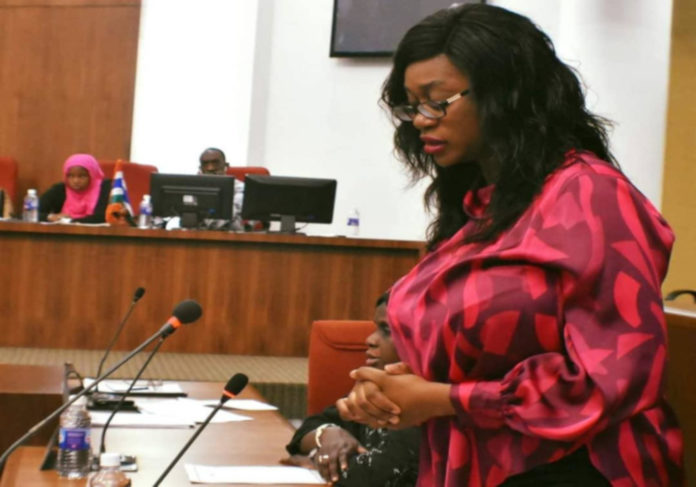By Yankuba Jallow
The Gambia Supreme Court has on Tuesday declared the purported revocation of Ya Kumba Jaiteh’s nomination as a member of the National Assembly by President Adama Barrow as unconstitutional.
The apex court held the President lacks the power to revoke the nomination of a nominated member of the National Assembly adding that the laws do not confer him such powers.
“The purported termination of the appellant’s (Ya Kumba’s) nomination through an executive order is unconstitutional, null and void,” Justice Hassan B. Jallow said.
He said the nomination of Foday Gassama is unconstitutional, null and void. Justice Jallow made orders for Gassama not to present himself as a member of the National Assembly.
Gassama was the third defendant in the case, but he has never appeared before the court and he was not represented by any counsel.
Ya Kumba Jaiteh brought action before the Supreme Court to declare the revocation of her nomination as a member of the National Assembly by President Adama Barrow as unconstitutional. She wanted the Supreme Court to declare whether President Barrow had the power to revoke her nomination under the Constitution.
She contended that her purported revocation lacks legal basis because the laws did not confer him with such powers. The Attorney-General, Ba Tambadou contended that Ya Kumba does not provide with specificity any provision of the Constitution ousting such powers of the President. Tambadou submitted that Jaiteh should serve at the pleasure of the President. The Attorney-General relied on the provision of section 231 (1) of the Constitution and section 20 of the Interpretation Act while the plaintiff, Ya Kumba relied on sections 89, 90 and 91 of the Constitution.
She said there is no distinction between an elected member and a nominated member. She argued that once a person becomes a nominated member of the National Assembly (NA), he or she could only be removed as set out under section 91 of the Constitution, which according to her explains the procedure of removal of a member of the NA.
She maintained that Section 91 does not vest any powers on the President to revoke the nomination of a member of the NA once the prescribed oath is taken and the person nominated is a substantive member of the NA. She cited 89(2) which according to her provides that one does not become a member of the NA without taking the prescribed oath. She put forward that once a nominated member becomes a substantive member of the NA, he or she has the privileges and rights as that of an elected members.
She continued with her argument saying Section 91 is a specific provision whereas section 231 is a general provision.
“When a specific provision has been made, reliance cannot be made on a general provision to defeat or contradict the specific provision,” she said.
Tambadou said the Constitution should be read in piece but as a whole, adding that section 91does not accord itself exclusivity for removing a member of the NA.
“Section 91 is not in conflict with 231,” he said.
He said the Plaintiff’s case lacks merit as he urged the court to declare that the President does not contravene any provisions of the Constitution.
Section 89 and 90 talk about qualification and disqualification for membership of the National Assembly respectively, section 91 explains tenure of the seat of National Assembly members while 231 talks about the constitution of various powers.
Justice Hassan B. Jallow said the letter from the Secretary-General and Head of Civil Service purportedly terminating Jaiteh’s nomination did not provide the legal basis for the revocation.
The Chief Justice held that section 231 is a general provision while section 91 of the 1997 Constitution is a specific provision.
“The provisions of section 89, 90, 91 and 231 (1) of the Constitution do not give the President the powers to revoke the nomination of a National Assembly member,” Jallow said.
Jallow dismissed Ba Tambadou’s submission that a nominated member should serve at the pleasure of the President.
“An office cannot be held at the pleasure of an authority,” Jallow held.
Jallow continued: “the powers to appoint or dismiss under section 231 , if any, does not include the revocation of the nomination of a National Assembly member.”
“The President has no power to revoke the nomination of a National Assembly member under section 231 nor is it provided under section 89, 90 and 91 of the Constitution.”
The learned judge held that section 20 of the Interpretation Act has been overtaken by sections 89, 90 and 91 of the Constitution.
“Section 20 of the Interpretation Act does not apply to nominated members of the National Assembly,” Jallow said.
He said a nominated member can only cease to be a National Assembly member-only as provided for under sections 89, 90 and 91 of the Constitution. Justice Jallow said the 1997 Constitution provides a system of governance based on the principle of separation of powers. He said if nominated members of the National Assembly are appointed to serve at the pleasure of the President, it will violate the doctrine of separation of powers.
Ya Kumba was represented by lawyers Borry S. Touray, Sherriff Kumba Jobe, Yassin Senghore and Aziz Bensouda whereas Binga D. together with Counsels A.A. Ceesay and K. Tah appeared for the Attorney General, the Clerk and the Speaker of the National Assembly.


















